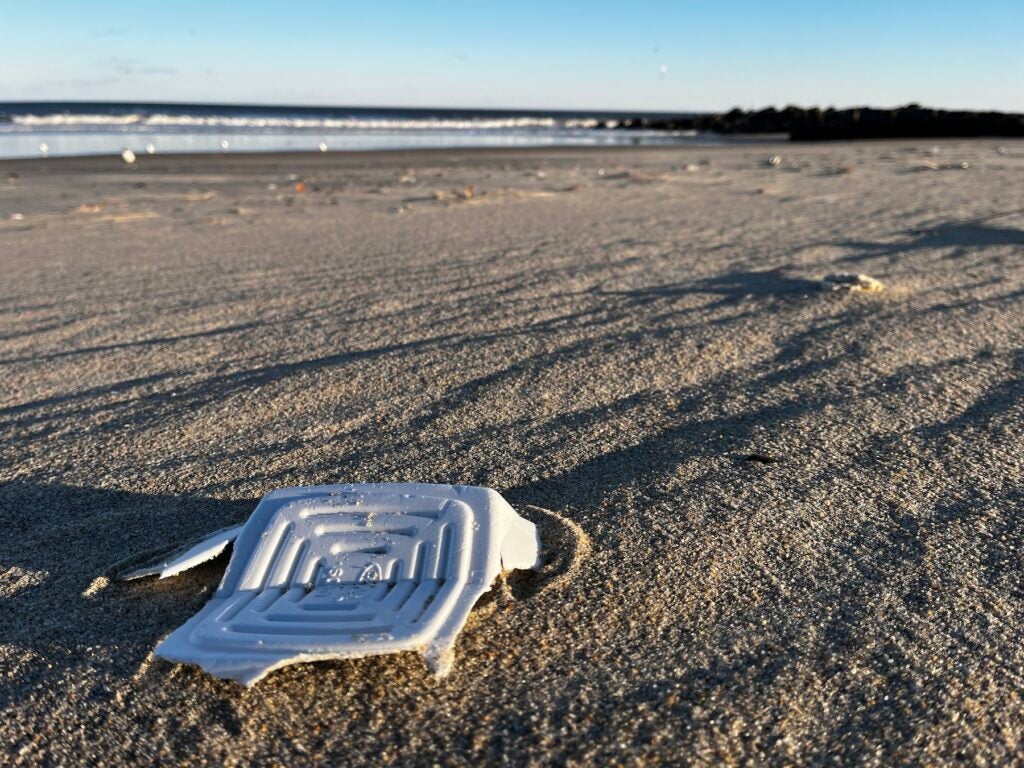Styrofoam finally off the menu at Delaware eateries, 2 years after ban passed
Food in containers made of the white plastic foam can no longer be given to diners who eat in, take leftovers or pick up takeout orders.
Listen 2:14
Meghan Knapp of Stanley's Tavern shows the aluminum containers the popular hangout north of Wilmington uses instead of Styrofoam. (Cris Barrish/WHYY)
From Philly and the Pa. suburbs to South Jersey and Delaware, what would you like WHYY News to cover? Let us know!
Customers at Delaware’s 2,000 restaurants, food trucks and other eateries should no longer see one particular item when they get their food at the table, as leftovers or in takeout orders — Styrofoam containers.
Plates, bowls, cups and other packaging made of the white spongy-ish product also known as plastic foam were banned in Delaware by lawmakers in 2023. The bill didn’t take effect until July 1 of this year, however, as food establishments were given time to use their inventories and prepare for Styrofoam-free operations.
Violations can bring civil fines of $100 to $1,000, but that enforcement provision won’t take effect until July 2026.
Styrofoam has been ubiquitous for decades in the food industry and for packing other products — like that last television you bought — but has long been maligned by environmentalists because making it degrades air quality, its harmful chemicals can enter the human bloodstream and once it’s used, it typically ends up in landfills, or as litter on roadways or in waterways.
Twelve states, including New Jersey and Maryland, have some form of a Styrofoam ban, as do dozens of countries. A bill introduced in Pennsylvania’s legislature this year would ban food establishments from using Styrofoam, but it hasn’t received a committee hearing yet.
John Weber, of the conservancy group Oceana, applauds Delaware for joining the anti-Styrofoam ranks.
“It’s problematic in the environment,” Weber told WHYY News. “It’s lightweight, so it blows and floats and gets downstream and into places it shouldn’t be. Its base chemical is styrene, so it does have toxic chemicals in it that can leach into your food from hot food. So there’s really good reasons that states have done it.”

A recent Oceana report cited polystyrene’s toll on U.S. rivers, lakes and marine environments.
“Polystyrene contributes to the 170 trillion microplastic particles floating in our oceans and has been detected in their deepest recesses,” the report said. “Polystyrene has even been found in the clouds floating overhead, the water we drink, the air we breathe and the blood pumping through our veins.”
Weber, Oceana’s senior field rep for Delaware and New Jersey, said a 2025 national poll showed that 78% of registered voters support policies to reduce Styrofoam use.
“A lot of people don’t want their food touching it,’’ he said.
The law does have one exclusion. Health care providers, which include hospitals, nursing homes and other outpatient centers, can serve food in Styrofoam containers to patients or residents. An earlier version of the bill, removed by lawmakers, would also have exempted fire halls and nonprofits from the ban.
The law also forbids eateries from providing plastic beverage stirrers, cocktail picks or sandwich picks. Serving plastic straws with beverages is also outlawed, but restaurants must provide one without question should a customer request one.
‘Better for nature, more consumer friendly’
The Delaware ban overcame objections from numerous fronts, including the Delaware Restaurant Association, state Chamber of Commerce and Chemical Industry Council of Delaware.
Carrie Leishman, president and CEO of the Delaware Restaurant Association, said the bill makes it harder for smaller and ethnic restaurants, as well as food trucks, to make ends meet, because alternative packaging such as aluminum is more expensive than Styrofoam. She said her association has tried to keep members apprised of the change, and is gratified that no fines will be levied for a year.
“Most of our members have moved away from Styrofoam. They just have,’’ she said. “And they’ve adopted more environmentally-friendly packaging, which is a good thing and what we really applaud.”

Leishman said restaurants are struggling with costs of food and other supplies.
“Profit margins are very slim,” she said. “We don’t know when tariffs will come in, which will impact the cost of goods and pricing. It already has. And even as consumers, we see prices going up in food in restaurants and non-restaurant settings. It all matters right now.”
The implementation of Delaware’s ban didn’t seem to phase managers at a few restaurants north of Wilmington that WHYY News visited this week, however.
Courtney Howie, service manager at LongHorn Steakhouse on Concord Pike, said she supports the prohibition and her establishment has never used Styrofoam packaging.
“It’s better for the environment, better for nature, more consumer friendly,’’ she said. “People are more conscious about the kind of by-products that the containers have and what happens when you consume things that are stored or kept in those containers.”
At Stanley’s Tavern at Foulk and Grubb roads, general manager Meghan Knapp said the popular hangout already uses aluminum containers for takeout. The only issue they’ve had with the ban has nothing to do with Styrofoam.
“People want drinks with straws in them,’’ she said, adding that some also want stirring sticks but “we’re not allowed to use them at all.”
When customers do request a straw, Knapp said, “then you have to explain why you didn’t give it in the first place.”


Get daily updates from WHYY News!
WHYY is your source for fact-based, in-depth journalism and information. As a nonprofit organization, we rely on financial support from readers like you. Please give today.







